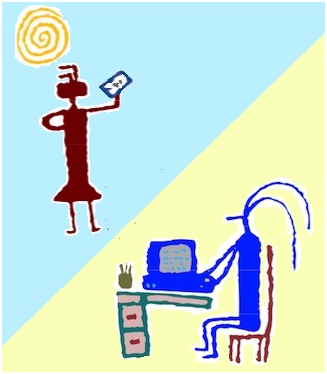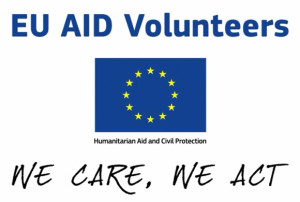 When you work in humanitarian initiatives in other countries, whether your project concerns water or HIV/AIDS or maternal health or vaccines or bridge construction or government web sites or whatever, your nonprofit headquarters and your donors will emphasize over and over that you must employ ways for the local people to participate in decision-making.1,2
When you work in humanitarian initiatives in other countries, whether your project concerns water or HIV/AIDS or maternal health or vaccines or bridge construction or government web sites or whatever, your nonprofit headquarters and your donors will emphasize over and over that you must employ ways for the local people to participate in decision-making.1,2
Yet, too often participatory decision-making doesn’t happen in developed countries, by the governments that fund overseas initiatives and demand details about how participatory decision-making was assured.
The backlash against the European Commission (the government of the European Union), manifested most recently by Brexit and the Belgian region of Wallonia rejecting a long-planned free trade pact between the EU and Canada3, are great examples of lack of participatory decision-making.
So is the anger in Portland, Oregon regarding the new contract with Portland Police Department4, 5
And so is the anger and protests regarding the Dakota Access Pipeline. The pipeline is being built by Texas-based Energy Transfer Partners and will transport as many as 570,000 barrels of crude oil daily from North Dakota to Illinois. The Midwest Alliance for Infrastructure Now, a group that supports the pipeline, says 100% of the affected landowners in North Dakota, where part of the Standing Rock Sioux Tribe lives, voluntarily signed easements to allow for construction, and the Army Corps of Engineers, the consulting agency for the project, has a list of dates it said it contacted the tribe, or tried to and never heard back.6, 7 In addition, government officials believe they have followed the consultation process promoted by the President’s office in 2010.8
But the Seattle Times says “Environmental documents filed by the company show that during its permit application the tribe was not even listed in the entities consulted during a piecemeal, fast-track review of the project by the Corps. Company contractors contacted the county weed board, the Audubon Society, county commissioners and more. But not the Standing Rock Sioux Tribe, permitting documents show.” The company has not allowed the tribe’s archaeological experts to review the ground in the path of the pipeline as it comes toward Standing Rock. The tribe’s expert, Tim Mentz Sr., in a review at the invitation of a private landowner, discovered some important artifacts, including stone effigies, burial sites and rare depictions of celestial constellations. The Seattle Times says, “So confident was Energy Transfer Partners that its work would go smoothly, that it started building the pipeline last spring, long before it had all its last permits in hand.”9
There can be no argument that tribes have been historically unable to influence projects that affect them and the land they hold sacred so this feels like just yet another land grab against native people in the USA that will marginalize them and hurt their lives. Sarah Krakoff, a professor at the University of Colorado specializing in American Indian Law and Natural Resources Law, says, “Sometimes what the agencies think of as adequate and with all good intentions do not feel adequate from the tribal side. Either because the process isn’t meaningful to them, it doesn’t accord with their timeframe or decision frame.”
Even when participatory decision-making is emphasized, the actions taken that are supposed to provide ways for lots of different people to influence what’s happening can be just for show; any community activist can tell a story about meticulously capturing the input of a group through a variety of listening exercises, only to have all that feedback utterly ignored in the final plans. I don’t know that this happened in the case of the Dakota Access Pipeline, but I’ve seen it happen overseas in my own humanitarian agency work; it’s infuriating.
And even well-done participatory decision-making isn’t always enough to keep protests at bay: until 2016, the ongoing consultative processes regarding the Malheur National Wildlife Refuge between local people, including ranchers, birders, outdoor enthusiasts, environmentalists, tribal members and others was considered a model for other communities. But that process, including a landmark 2013 agreement, didn’t stop people from far outside the area from using guns and force to invade the refuge, occupy it and cause many thousands of dollars in damage, including to private property and tribal lands.10, 11
On a related note, social media posts the Dakota Access Pipeline are often tagged with #NoDAPL, and slackervism / slactivism abounds, with people posting memes in support of the the Standing Rock Sioux Tribe, or adjusting their Facebook page to show they are at the Standing Rock Indian Reservation when they actually aren’t.12 It’s supposed to somehow create support for the tribe and to confuse law enforcement authorities regarding who is at Standing Rock and who isn’t, but Snopes points out that there’s no record that such has helped at all, including in attracting more “material assistance.”13
Since I’m really not fond of slacktivism, here are ways to REALLY help re: #NoDAPL without leaving your house or coffee shop or wherever you are with Internet and phone access :
(1) Call North Dakota governor Jack Dalrymple at 701-328-2200, leaving a RESPECTFUL, firm message on this subject (I find writing out the statement & reading from it helps me).
(2) Call the White House at (202) 456-1111 or (202) 456-1414 & tell President Obama to rescind the Army Corps of Engineers’ Permit for the Dakota Access Pipeline.
(3) Sign the petition at petitions.whitehouse.gov
(4) Contact the executives of Energy Transfer Partners that are building the pipeline:
Lee Hanse, Executive Vice President
Telephone: (210) 403-6455 or email: Lee.Hanse@energytransfer.com
Glenn Emery, Vice President
Telephone: (210) 403-6762 or email: Glenn.Emery@energytransfer.com
Also see:
Sources:
- Oil workers and oil communities: counterplanning from the commons in Nigeria, Terisa E. Turner 1997
- LEFT BEHIND; As Oil Riches Flow, Poor Village Cries Out, New York Times
- Wallonia rejects EU ultimatum over Canada free trade deal, EuroNews
- Portland City Council approves police contract amid unruly protest, Oregon Live
- Why protesters are mad about the police contract, Oregon Live
- What to Know About the Dakota Access Pipeline Protests, Time
- Tribal Consultation At Heart Of Pipeline Fight, insideenergy.org
- Guidance for Implementing E.O. 13175, “Consultation and Coordination with Indian Tribal Governments” , whitehouse.gov
- The violent Dakota Access Pipeline protest raged for hours — until this tribal elder stepped in, Seattle Times
- Audubon Society of Portland Statement on the Occupation of Malheur National Wildlife Refuge
- Beyond the Oregon Protests: The Search for Common Ground, Environment 360, Yale University
- Standing Rock Facebook Check-in, CNN
- Facebook check-in at Standing Rock, Snopes




 I got this message from a friend. And then I had another situation I had wanted to offer up on a blog as well. So… what do you think about the ethics of required parental volunteering in schools?
I got this message from a friend. And then I had another situation I had wanted to offer up on a blog as well. So… what do you think about the ethics of required parental volunteering in schools?

